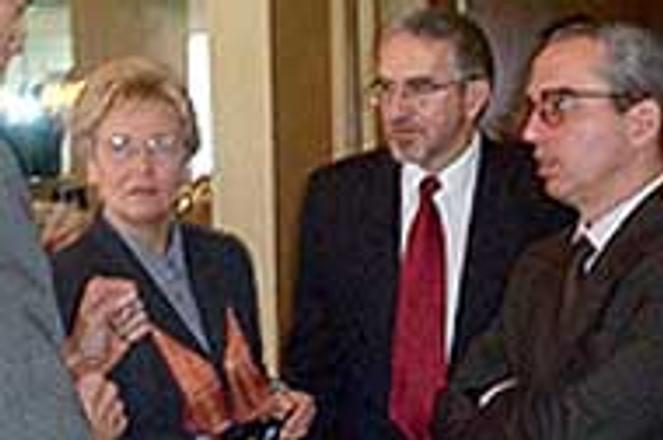Finance Minister Brigita Schmögnerová (second from left) failed to break the deadlock over the World Bank loan in Washington.photo: TASR
The government's failure to reach an agreement with the International Monetary Fund (IMF) and World Bank (WB) on a $400 million EFSAL loan for vital corporate and banking sector restructuring in Washington last week has renewed concerns over the direction of economic policy within the ruling coalition.
Despite assurances from Slovak Deputy Prime Minister for Economy Ivan Mikloš that there was still a chance that an agreement on the loan could be reached, he admitted that the differences within the coalition itself - specifically between himself and Finance Minister Brigita Schmögnerová - over IMF involvement in the loan would necessitate further tough negotiations.
"We have not succeeded in coming to an agreement regarding the methods of providing technical help [as a condition of the World bank loan]. These standpoints differ within the government as well as within the IMF and the World Bank," Mikloš said.
Talks between the two international financial institutions and government representatives originally faltered after Schmögnerová balked at the World Bank's insistence that its loan was conditioned with a stand-by agreement whereby Slovakia would take help from the IMF in the form of expert technical assistance for the reforms and monitoring of the macro-economic development of the country.
Schmögnerová and central bank governor Marián Jusko said that such conditions were only attached to loans given to countries with weak and fragile economies and that it may cause international ratings agencies, such as Moody's or Standard and Poor's, to downgrade their sovereign country ratings for Slovakia.
Mikloš argued that the involvement of the IMF would not affect international standing and would, in fact, give Slovakia a credibility boost in the eyes of many potential investors.
The minister said on April 18 that while both he and Schmögnerová were agreed on the benefits of co-operating with the two institutions, there was still discord over the actual level of that co-operation and the interlinking of IMF and World bank proposals.
At the beginning of April the World Bank offered six alternatives to the government for taking the loan, only one of which was conditioned with the stand-by agreement.
World Bank representatives were disappointed at the lack of a breakthrough at the Washington talks. However, officials said that they were optimistic a deal could eventually be secured.
Senior sources close to the negotiations admitted that the talks had stalled badly over the differences between the World Bank and Slovakia. However, they added that the negotiations were in a crucial stage at present and that the negotiations in Washington merely clarified both sides' positions.
Finance Ministry officials remained optimistic about further talks. "Nothing has been decided yet and there is still optimism. The [negotiating] process is going on as normal," said Juraj Renčko, advisor to Minister Schmögnerová.
The divisions between the two ministers over the loan have again highlighted their continuing differences on economic development. Schmögnerová and Mikloš have often disagreed on key reform issues. One year ago, a coalition crisis was averted at the last minute after the two ministers had disagreed bitterly over whether to introduce an import surcharge or a hike in VAT.
Western organisations such as the IMF have stressed the need for both economic and political stability to be ensured.
Mikloš said at the end of the Washington talks that the most important thing for the IMF and World Bank was the assurance of political stability in Slovakia and "irrevocable support for ongoing economic reforms".
However, the recent surprise vote of Jozef Migaš, Speaker of Parliament and Party of the Democratic Left (SDĽ) chairman, in which he voted against Prime Minister Mikuláš Dzurinda in a vote of non-confidence - an incident that Mikloš said had been viewed negatively by the West - has heightened analysts' concerns that the coalition is not doing enough to defuse potentially damaging internal conflicts.
Ján Tóth, analyst at ING Bank in Bratislava, said that threats of a break-up of the coalition in the wake of Migaš's vote had little base and were not likely to alter investors' views of stability in Slovakia. However, he said that the specific disagreements over the loan were a more serious concern.
"In terms of the World Bank loan, investors should be concerned about the signals the World Bank is giving out. Schmögnerová already questioned the taking of WB loans one year ago when the government was introducing its austerity measures, so there is nothing new in her opinion. That is what investors should be thinking about."
"If the government is going to carry on with this opinion of trying to do things the 'Slovak way', I would be worried if I were an investor," Tóth said.
He added that the differences in opinion of the two ministers had always been a source of concern, but that this, combined with the current stance on the loan, could damage attempts to attract investors.


